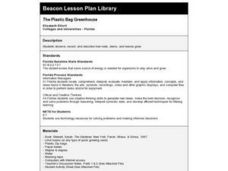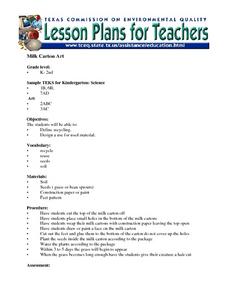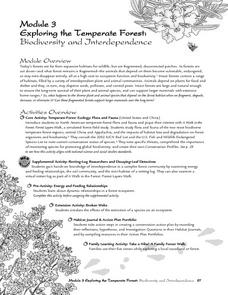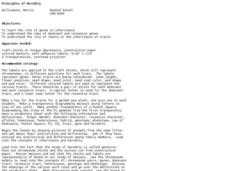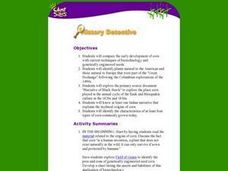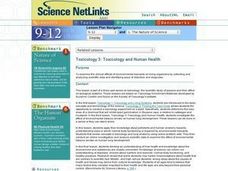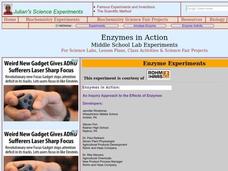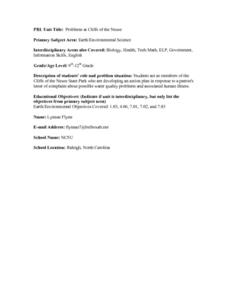Curated OER
Clothesline Sleuth
Third graders discover the origin of an item of clothing. For this clothing lesson, 3rd graders navigate the net to locate information related to various fabrics. Students answer questions and define vocabulary about...
Curated OER
Life in a Cup
Third graders make and maintain a mini terrarium. They keep a daily journal of what happens in their terrarium and record daily observations and measurements.
Curated OER
The Plastic Bag Greenhouse
Third graders observe plants and record their growth. They describe the parts of plants in detail including the roots, stems and leaves.
Curated OER
Speedy Succession
Fifth graders investigate how a pond ecosystem can change into a prairie or grassland ecosystem. They observe a small pond ecosystem in a two liter soda bottle, and examine and record changes over a two-week period of time on a worksheet.
Curated OER
Exploring the Temperate Forest: Biodiversity and Interdependence
Middle schoolers examine the consequences of cutting down large amounts of forests throughout the world. In groups, they use the internet to complete a module taking them on a tour through different temperate forests. To end the lesson...
Curated OER
Principles of Heredity
Students model traits on genes using colored paper and tongue depressors to represent chromosomes. In this heredity lesson plan, students use their "chromosome sticks" to understand chromosome pairs, genes, dominant traits, recessive...
Curated OER
Flower Pot Salad Bar
Students discuss the connection between a flower pot and wholesome food by creating a salad. For this healthy eating lesson, students utilize numerous fresh vegetables to create a classic salad in a flower pot. Students write...
Curated OER
Back to the Farm
Students complete a family tree. In this farming and ranching lesson, students define the term genealogy, learn how to create a family tree, and fill in a family tree with the help of their parents making sure to note if any of...
Curated OER
Pollination
In this pollination worksheet, students read and assess comprehension. In this labeling and filling in the blanks worksheet, students answer fourteen questions.
Curated OER
Make your Garden Grow
Fourth graders role play as certified horticulturists as they study the biology of plants and gardening. They design a garden for their school based on what they researched and a given budget.
Curated OER
Fruit or Vegetable?
Watermelon is a vegetable? A tomato is a fruit? Believe it or not, this debate is decades old. Groups examine rulings by the US Supreme Court, the USDA, and state statutes before developing their own criteria to use when labeling...
Curated OER
Who Needs What?
Students identify the physical needs of animals and if plants need the same things as animals. They conduct an experiment to see if plants need light and water to grow. They compare the growth of the plants exposed to the different...
Curated OER
Plants And Pollination
Students describe sexual reproduction in plants, including the process of pollination, how insects assist in pollination, and how pollination differs from fertilization. They also explore the importance of honey bees to Arizona agriculture.
Curated OER
Specialty Crop Production/Orchids
Twelfth graders explore the fascinating world of orchid production including propagation, care, culture, and finishing. They complete market research and design a production schedule for an orchid crop of their choice. They write a short...
Curated OER
Splish! Splash! Birdbath
Learners explore the concept of philanthropy. In this service learning lesson, students research city wildlife then plan and implement a service learning project that benefits wildlife.
Curated OER
Importance of Rice
Third graders explore the importance of rice in our world. In this rice farming lesson, 3rd graders discover how much rice we use on a daily basis. Students also discover myths from other cultures about rice. Students color code a map of...
Curated OER
Toxicology And Human Health
Learners examine the clinical effects of environmental toxicants on living organisms by collecting and analyzing scientific data and identifying ways of detection and diagnosis.
Curated OER
Enzymes in Action
Students explore how enzymes are important in the chemical reactions of all living things. In this enzymes and catalysts lesson students complete an activity to see how enzymes change living things.
Curated OER
Problems at Cliffs of the Neuse
Students assume the roles of members of the Cliffs of the Neuse Sate Park and must develop an action plan in response to a complaint about possible water quality problems and associated human illnesses. Students conduct research on the...
Curated OER
Kingdoms of All Living Things
In this biology worksheet, students identify and locate various vocabulary terms related to the kingdoms of all living things found on earth. There are 24 biology terms located in the word search.
Curated OER
How Do We Use Scientific Inquiry To Solve the World's Problems?
Ninth graders examine how a scientific investigation is performed. They read and discuss examples of various scientific experiments, design an experiment involving fast growing plants, and create graphs and charts to present their...
Curated OER
"Garden Springs Gardeners"
First graders ponder the question of how plants help their lives. They observe and compare properties of several different plants. Differentiate between living organisms and nonliving objects.




